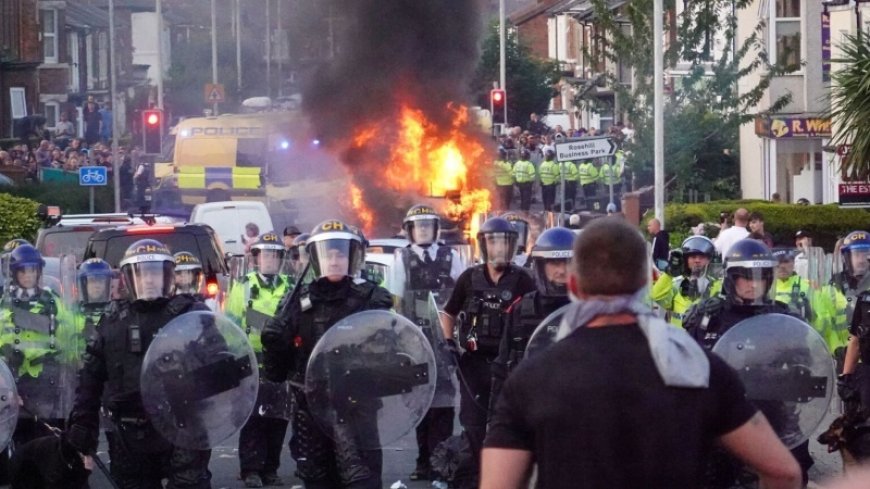Drawing on Islamophobia and xenophobia, racist currents in England seek to exploit social discontent and promote division and violence. Meanwhile, support for Israel and Zionist groups has also played a major role in fuelling the unrest. Following recent unrest and riots in England, far-right groups have attacked immigrants and Muslims. The unrest has intensified following a fatal stabbing attack on three young girls in Southport, England, AP reports.
The attack was carried out by a 17-year-old suspect who was misrepresented on social media as a Muslim immigrant, although he was in fact born to Rwandan Christian parents.
The story involved riots and attacks on refugee hotels by far-right provocateurs. One of these provocateurs, Tommy Robinson, founder of the English Defence League (EDL), has been raising tensions with provocative videos on social media. Robinson is currently working in Cyprus. He went there to escape English court orders.
These extreme currents are not limited to Robinson. High-profile figures such as Andrew Tate and Nigel Farage have also been accused of inciting the unrest. Nigel Farage, the leader of the anti-immigration movement Reform UK and a member of parliament, has made controversial statements against immigrants and Muslims.
He recently said Muslims were incompatible with British values. In his speech, Farage justified street riots as a "response to public fear and discontent" and threatened the future: "What you see on the streets of Hartlepool, London or Southport is nothing compared to what could happen in the coming weeks."
The British government, led by Prime Minister Keir Starmer, strongly condemned the riots, calling them “unlawful thugs and mobs.” In a televised address, he said: “I guarantee you will regret taking part in these riots, either directly or as those who incite them in cyberspace.”
Home Secretary Yvette Cooper also told Sky News: "People who thought they were on summer holidays will now be faced with police at home."
Also, Neil Basu, the former head of Britain's counter-terrorism police, accused Farage of failing to condemn the violence, saying: "Did Nigel Farage condemn the violence? Did he condemn the English Defence League?"
Far-right movements in England have not only provoked domestic unrest, but in some cases have also supported Israeli policies. For example, last May, hundreds of right-wing nationalists and Israel supporters gathered outside a small cinema in north London to protest against pro-Palestinian activists. The rally was part of a film festival sponsored by the Israeli government.
One of the rally's organisers told Middle East Eye: "They were shouting and getting close to our faces, trying to grab our posters and banners and using racist slurs."
Groups with obvious ties to Israel, such as Enough is Enough and the 7/10 Human Chain Project, which emerged after October 7, were among the main instigators of these gatherings. In addition, far-right activists such as Sam Westlake and Brian Stovell also participated in these rallies.
The riots and clashes have not only caused harm to immigrant and Muslim communities, but have also increased fear and uncertainty among these communities. Police and government officials have stressed that they will deal with those responsible for the violence and disorder. Veteran Labour MP Diane Abbott tweeted: “Anti-immigrant rioting across the country is at an unprecedented level. Threats to lives, property and our police. We need to reconvene Parliament.”
The results of the recent riots and attacks in England show that far-right movements led by the likes of Tommy Robinson, Andrew Tate and Nigel Farage are attempting to spread hatred and violence against immigrants and Muslims, misusing false information to fuel social tensions. Drawing on Islamophobia and xenophobia, these movements seek to exploit social discontent and promote division and violence. Meanwhile, support for Israel and Zionist groups has also played a major role in fuelling these riots; however, society and the British government must confront these movements with unity and cooperation to maintain security and social solidarity in this country.














































